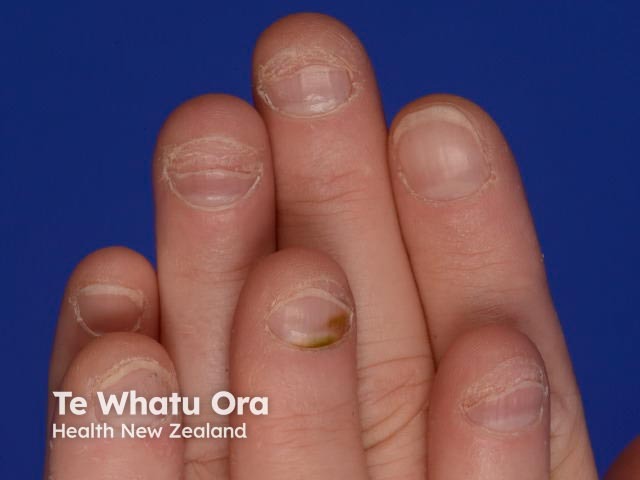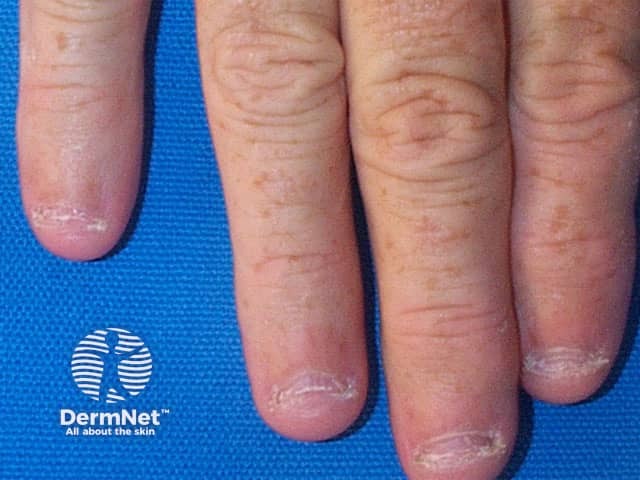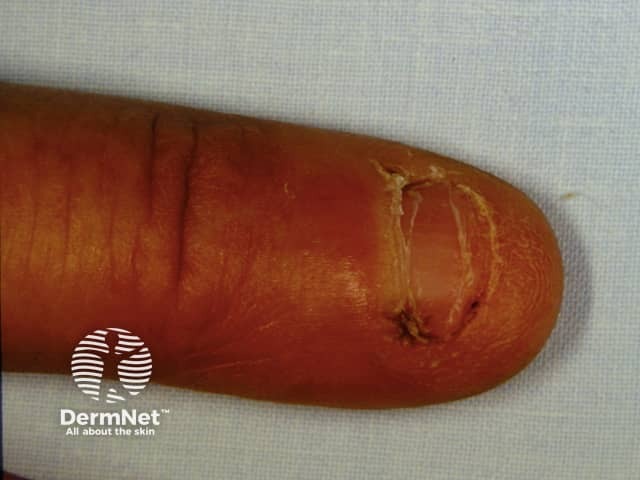Main menu
Common skin conditions

NEWS
Join DermNet PRO
Read more
Quick links
Onychophagia — extra information
Onychophagia
Author: Brian Wu, MD candidate, Keck School of Medicine, Los Angeles, USA. DermNet New Zealand Editor in Chief: Hon A/Prof Amanda Oakley, Dermatologist, Hamilton, New Zealand. December 2016.
Introduction Psychosocial and physical complications Assessing the impact Nail biting and dysmorphia Treatment
What is onychophagia?
Onychophagia is the clinical name for fingernail biting. It is a common stress-related or nervous habit in children and adults. It involves biting off the nail plate, and sometimes the soft tissues of the nail bed and the cuticle as well. Onychophagia is a type of onychotillomania, which includes the habit of picking or otherwise manipulating the nails - for example, habit-tic nail deformity.
Some researchers believe that nail biting is a result of a delay or dysfunction in the oral stage of psychological development.


Onychophagia

Onychophagia
What psychosocial and/or physical problems does onychophagia cause?
Onychophagia can cause distress, emotional tension or social embarrassment. It is associated with other habit disorders, including trichotillomania and compulsive skin picking.
While it does not cause them, onychophagia is associated with a variety of psychiatric disorders, including:
- Obsessive–compulsive disorder (OCD)
- Attentional deficit hyperactivity disorder (ADHD)
- Oppositional defiant disorder (ODD)
- Separation anxiety disorder
- Tourette syndrome.
It is also important to note that nail biting can also cause physical problems, including:
- Stomach infections resulting from the swallowing the bitten nails
- Fungal infections of the nail plate (onychomycosis) and surrounding skin (paronychia)
- Teeth root resorption
- Alveolar destruction
- Intestinal parasitic infections
- Temporomandibular joint pain and dysfunction.
Assessing the impact of onychophagia
While there is no assessment tool specific to onychophagia itself, some research has centred on the Strengths and Difficulties Questionnaire. This mental health tool is able to assess a variety of emotional and behaviour problems, including inattention and hyperactive behaviour, emotional symptoms, conduct problems, and prosocial behaviour. When dealing with onychophagia, it can be useful to consider the issues covered in this questionnaire as a way to look for relationships/associations that may influence the individual’s nail-biting habit.
Nail biting and dysmorphia
If left untreated, severe onychophagia can lead to dysmorphic dental problems, including:
- Malocclusion (imperfect positioning) of the front teeth
- Crowding, attrition and rotation of the teeth noted on X-rays
- Attrition of the incisional edge of the mandibular incisors (lower front teeth)
- Protrusion of the maxillary incisors (upper front teeth).
These problems can affect the individual’s physical appearance, but this can be avoided if the nail-biting habit is broken early.
How is onychophagia treated?
The treatment for onychophagia depends on the severity of the nail-biting habit:
- No treatment is necessary for mild onychophagia as a child can often outgrow the habit.
- Dermatologists recommend keeping the nails short and neatly trimmed, manicured, or covered to minimise the temptation to nail-bite.
- The application of bitter-tasting compounds to the nails to discourage nail biting is controversial and not very effective.
- Behaviour modification treatment can be effective.
- Any underlying mental health problem or psychiatric disorder should also be managed.
References
- American Academy of Dermatology. Dermatologists share tips to stop nail biting. 8 September 2015. Available at: www.aad.org/media/news-releases/dermatologists-share-tips-to-stop-nail-biting (accessed August 2016).
- Ghanizadeh A, Shekoohi H. Prevalence of nail biting and its association with mental health in a community sample of children. BMC Res Notes 2011; 4: 116. DOI: 10.1186/1756-0500-4-116. PubMed Central
- Pacan P, Grzesiak M, Reich A, Szepietowski JC. Onychophagia as a spectrum of obsessive-compulsive disorder. Acta Derm Venereol 2009; 89: 278–80. DOI: 10.2340/00015555-0646. Journal
- Sachan A, Chaturvedi TP. Onychophagia (Nail biting), anxiety, and malocclusion. Indian J Dent Res 2012; 23: 680–2. DOI: 10.4103/0970-9290.107399. Journal
On DermNet
- Trichotillomania
- Compulsive skin picking
- Body dysmorphic disorder
- Treatment of psychodermatological disorders
- The mind and the skin
- Treatment of psychodermatological disorders
Books about skin diseases
